Reflective Assignment: Mental Health and Patient Care
VerifiedAdded on 2022/10/02
|6
|1143
|484
Journal and Reflective Writing
AI Summary
This reflective assignment delves into the critical aspects of mental health care, particularly focusing on the patient's journey and the significance of self-care for both patients and healthcare professionals. The assignment uses the 5 R's of reflection (Reporting, Responding, Relating, Reasoning, and Reconstructing) to analyze a personal blog by Emily Hollingsbee, who discusses her struggles with mental health while working with refugees. The analysis explores the impact of compassion fatigue, burnout, and the importance of motivation, self-care, and therapeutic communication in facilitating recovery. The assignment highlights the need for healthcare providers to understand and address the mental and emotional challenges faced by their patients, emphasizing the role of hope, positivity, and support in overcoming mental illness. References to relevant research articles further support the arguments made in this reflective piece, reinforcing the practical implications of the insights gained.
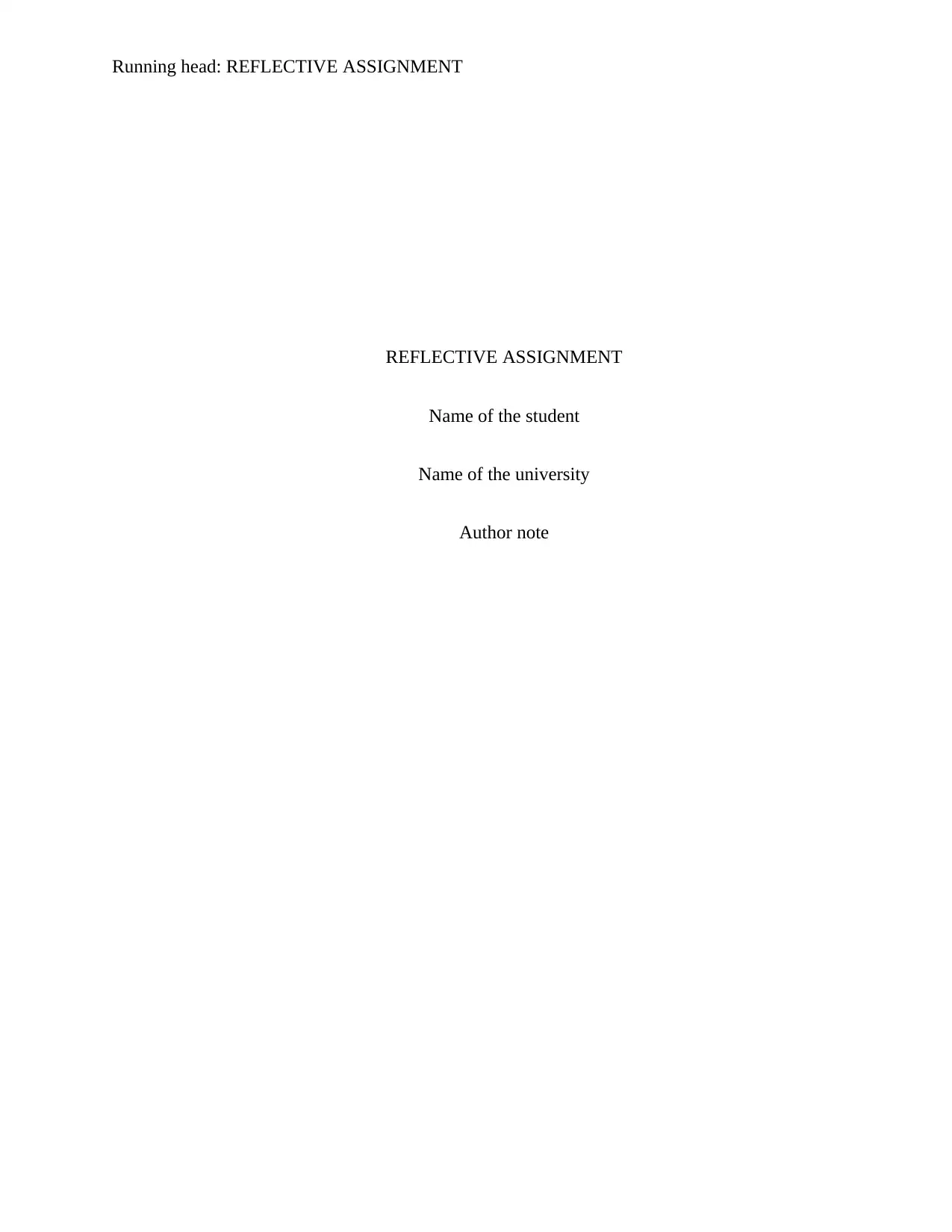
Running head: REFLECTIVE ASSIGNMENT
REFLECTIVE ASSIGNMENT
Name of the student
Name of the university
Author note
REFLECTIVE ASSIGNMENT
Name of the student
Name of the university
Author note
Paraphrase This Document
Need a fresh take? Get an instant paraphrase of this document with our AI Paraphraser
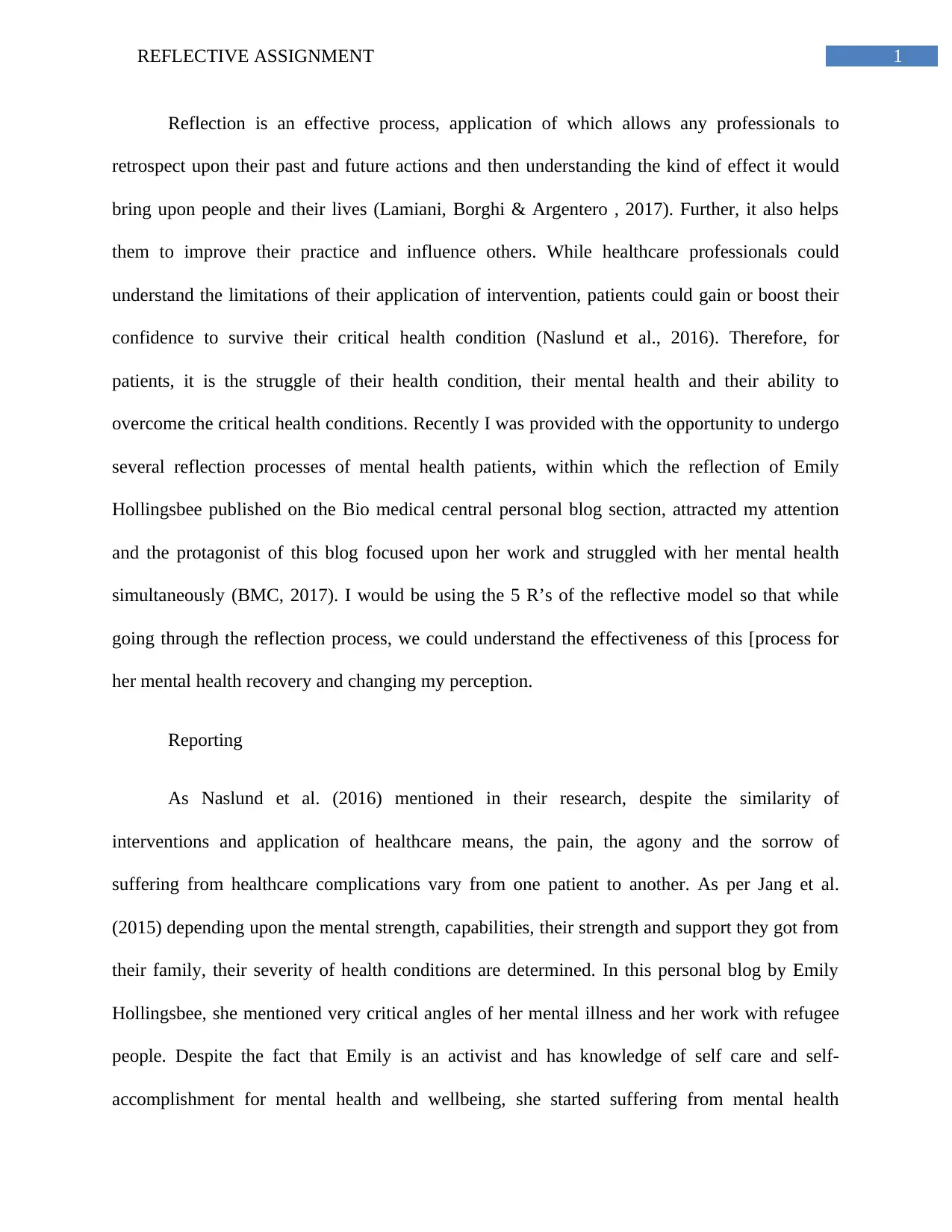
1REFLECTIVE ASSIGNMENT
Reflection is an effective process, application of which allows any professionals to
retrospect upon their past and future actions and then understanding the kind of effect it would
bring upon people and their lives (Lamiani, Borghi & Argentero , 2017). Further, it also helps
them to improve their practice and influence others. While healthcare professionals could
understand the limitations of their application of intervention, patients could gain or boost their
confidence to survive their critical health condition (Naslund et al., 2016). Therefore, for
patients, it is the struggle of their health condition, their mental health and their ability to
overcome the critical health conditions. Recently I was provided with the opportunity to undergo
several reflection processes of mental health patients, within which the reflection of Emily
Hollingsbee published on the Bio medical central personal blog section, attracted my attention
and the protagonist of this blog focused upon her work and struggled with her mental health
simultaneously (BMC, 2017). I would be using the 5 R’s of the reflective model so that while
going through the reflection process, we could understand the effectiveness of this [process for
her mental health recovery and changing my perception.
Reporting
As Naslund et al. (2016) mentioned in their research, despite the similarity of
interventions and application of healthcare means, the pain, the agony and the sorrow of
suffering from healthcare complications vary from one patient to another. As per Jang et al.
(2015) depending upon the mental strength, capabilities, their strength and support they got from
their family, their severity of health conditions are determined. In this personal blog by Emily
Hollingsbee, she mentioned very critical angles of her mental illness and her work with refugee
people. Despite the fact that Emily is an activist and has knowledge of self care and self-
accomplishment for mental health and wellbeing, she started suffering from mental health
Reflection is an effective process, application of which allows any professionals to
retrospect upon their past and future actions and then understanding the kind of effect it would
bring upon people and their lives (Lamiani, Borghi & Argentero , 2017). Further, it also helps
them to improve their practice and influence others. While healthcare professionals could
understand the limitations of their application of intervention, patients could gain or boost their
confidence to survive their critical health condition (Naslund et al., 2016). Therefore, for
patients, it is the struggle of their health condition, their mental health and their ability to
overcome the critical health conditions. Recently I was provided with the opportunity to undergo
several reflection processes of mental health patients, within which the reflection of Emily
Hollingsbee published on the Bio medical central personal blog section, attracted my attention
and the protagonist of this blog focused upon her work and struggled with her mental health
simultaneously (BMC, 2017). I would be using the 5 R’s of the reflective model so that while
going through the reflection process, we could understand the effectiveness of this [process for
her mental health recovery and changing my perception.
Reporting
As Naslund et al. (2016) mentioned in their research, despite the similarity of
interventions and application of healthcare means, the pain, the agony and the sorrow of
suffering from healthcare complications vary from one patient to another. As per Jang et al.
(2015) depending upon the mental strength, capabilities, their strength and support they got from
their family, their severity of health conditions are determined. In this personal blog by Emily
Hollingsbee, she mentioned very critical angles of her mental illness and her work with refugee
people. Despite the fact that Emily is an activist and has knowledge of self care and self-
accomplishment for mental health and wellbeing, she started suffering from mental health
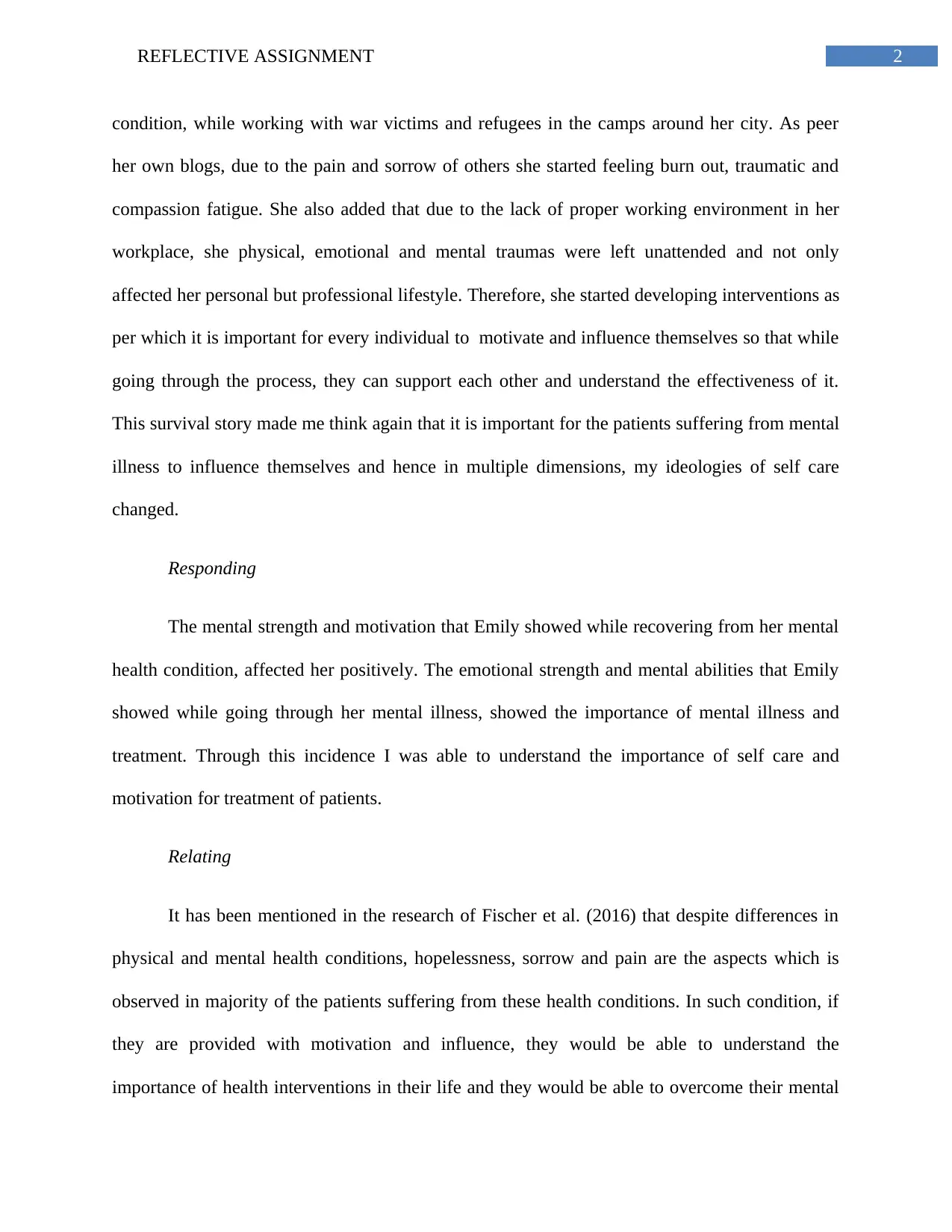
2REFLECTIVE ASSIGNMENT
condition, while working with war victims and refugees in the camps around her city. As peer
her own blogs, due to the pain and sorrow of others she started feeling burn out, traumatic and
compassion fatigue. She also added that due to the lack of proper working environment in her
workplace, she physical, emotional and mental traumas were left unattended and not only
affected her personal but professional lifestyle. Therefore, she started developing interventions as
per which it is important for every individual to motivate and influence themselves so that while
going through the process, they can support each other and understand the effectiveness of it.
This survival story made me think again that it is important for the patients suffering from mental
illness to influence themselves and hence in multiple dimensions, my ideologies of self care
changed.
Responding
The mental strength and motivation that Emily showed while recovering from her mental
health condition, affected her positively. The emotional strength and mental abilities that Emily
showed while going through her mental illness, showed the importance of mental illness and
treatment. Through this incidence I was able to understand the importance of self care and
motivation for treatment of patients.
Relating
It has been mentioned in the research of Fischer et al. (2016) that despite differences in
physical and mental health conditions, hopelessness, sorrow and pain are the aspects which is
observed in majority of the patients suffering from these health conditions. In such condition, if
they are provided with motivation and influence, they would be able to understand the
importance of health interventions in their life and they would be able to overcome their mental
condition, while working with war victims and refugees in the camps around her city. As peer
her own blogs, due to the pain and sorrow of others she started feeling burn out, traumatic and
compassion fatigue. She also added that due to the lack of proper working environment in her
workplace, she physical, emotional and mental traumas were left unattended and not only
affected her personal but professional lifestyle. Therefore, she started developing interventions as
per which it is important for every individual to motivate and influence themselves so that while
going through the process, they can support each other and understand the effectiveness of it.
This survival story made me think again that it is important for the patients suffering from mental
illness to influence themselves and hence in multiple dimensions, my ideologies of self care
changed.
Responding
The mental strength and motivation that Emily showed while recovering from her mental
health condition, affected her positively. The emotional strength and mental abilities that Emily
showed while going through her mental illness, showed the importance of mental illness and
treatment. Through this incidence I was able to understand the importance of self care and
motivation for treatment of patients.
Relating
It has been mentioned in the research of Fischer et al. (2016) that despite differences in
physical and mental health conditions, hopelessness, sorrow and pain are the aspects which is
observed in majority of the patients suffering from these health conditions. In such condition, if
they are provided with motivation and influence, they would be able to understand the
importance of health interventions in their life and they would be able to overcome their mental
⊘ This is a preview!⊘
Do you want full access?
Subscribe today to unlock all pages.

Trusted by 1+ million students worldwide
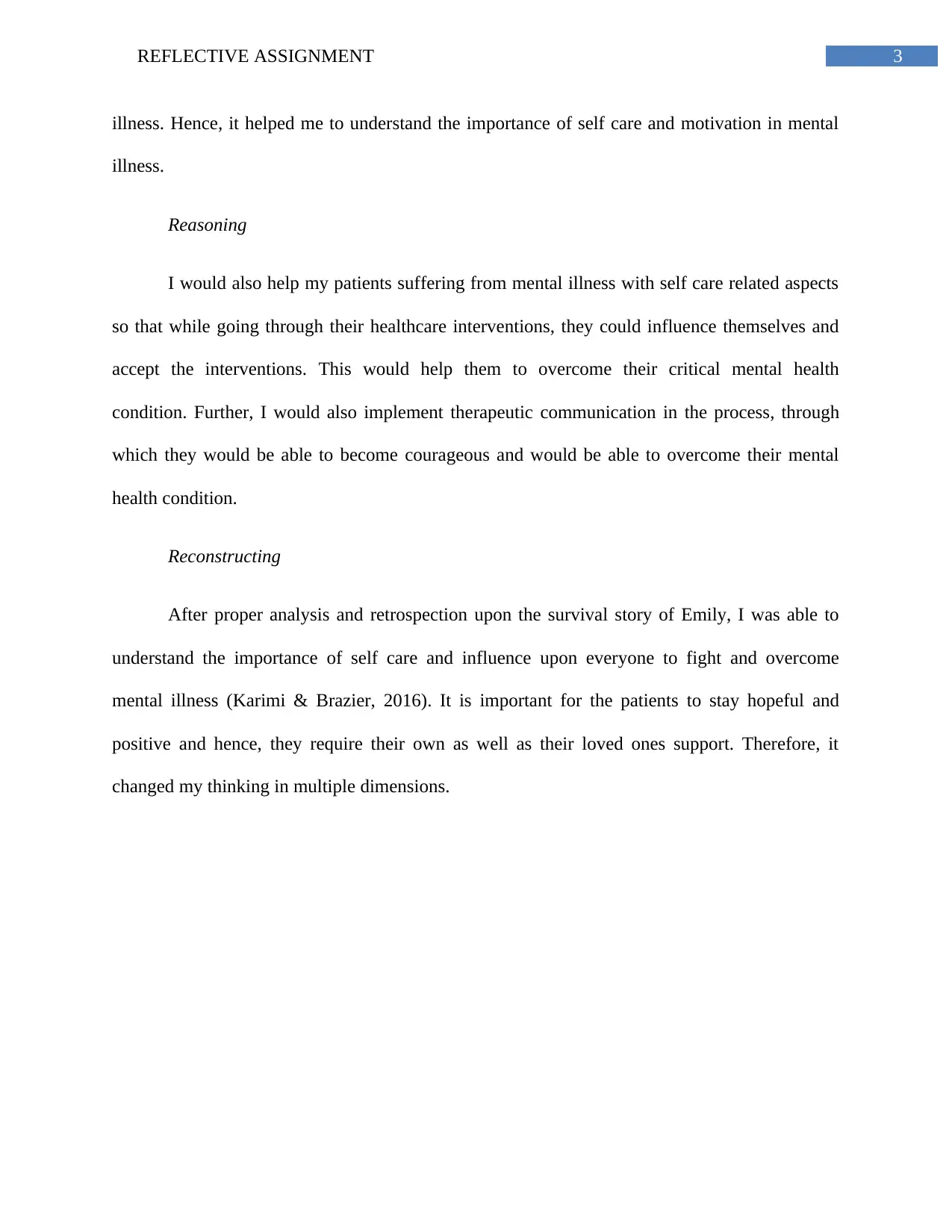
3REFLECTIVE ASSIGNMENT
illness. Hence, it helped me to understand the importance of self care and motivation in mental
illness.
Reasoning
I would also help my patients suffering from mental illness with self care related aspects
so that while going through their healthcare interventions, they could influence themselves and
accept the interventions. This would help them to overcome their critical mental health
condition. Further, I would also implement therapeutic communication in the process, through
which they would be able to become courageous and would be able to overcome their mental
health condition.
Reconstructing
After proper analysis and retrospection upon the survival story of Emily, I was able to
understand the importance of self care and influence upon everyone to fight and overcome
mental illness (Karimi & Brazier, 2016). It is important for the patients to stay hopeful and
positive and hence, they require their own as well as their loved ones support. Therefore, it
changed my thinking in multiple dimensions.
illness. Hence, it helped me to understand the importance of self care and motivation in mental
illness.
Reasoning
I would also help my patients suffering from mental illness with self care related aspects
so that while going through their healthcare interventions, they could influence themselves and
accept the interventions. This would help them to overcome their critical mental health
condition. Further, I would also implement therapeutic communication in the process, through
which they would be able to become courageous and would be able to overcome their mental
health condition.
Reconstructing
After proper analysis and retrospection upon the survival story of Emily, I was able to
understand the importance of self care and influence upon everyone to fight and overcome
mental illness (Karimi & Brazier, 2016). It is important for the patients to stay hopeful and
positive and hence, they require their own as well as their loved ones support. Therefore, it
changed my thinking in multiple dimensions.
Paraphrase This Document
Need a fresh take? Get an instant paraphrase of this document with our AI Paraphraser
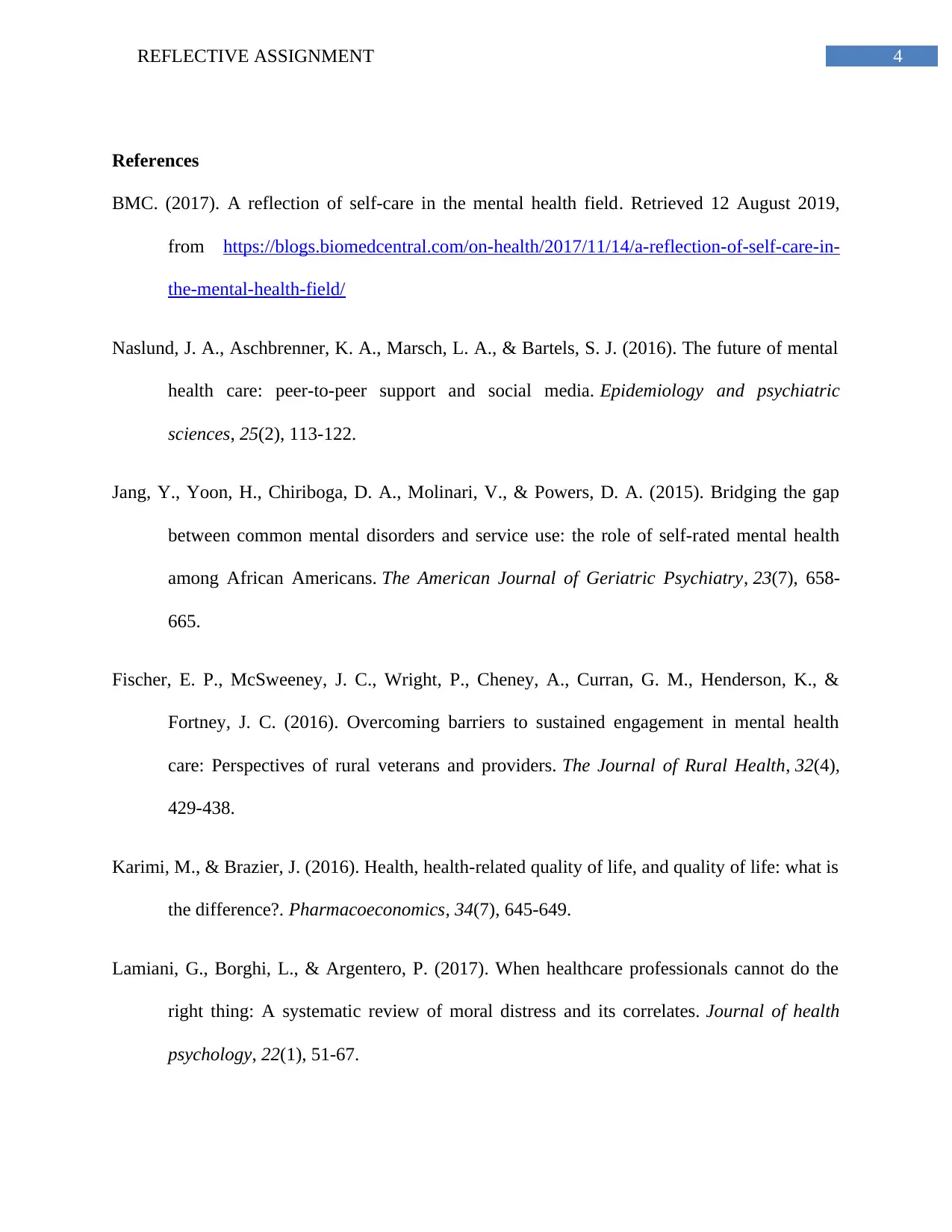
4REFLECTIVE ASSIGNMENT
References
BMC. (2017). A reflection of self-care in the mental health field. Retrieved 12 August 2019,
from https://blogs.biomedcentral.com/on-health/2017/11/14/a-reflection-of-self-care-in-
the-mental-health-field/
Naslund, J. A., Aschbrenner, K. A., Marsch, L. A., & Bartels, S. J. (2016). The future of mental
health care: peer-to-peer support and social media. Epidemiology and psychiatric
sciences, 25(2), 113-122.
Jang, Y., Yoon, H., Chiriboga, D. A., Molinari, V., & Powers, D. A. (2015). Bridging the gap
between common mental disorders and service use: the role of self-rated mental health
among African Americans. The American Journal of Geriatric Psychiatry, 23(7), 658-
665.
Fischer, E. P., McSweeney, J. C., Wright, P., Cheney, A., Curran, G. M., Henderson, K., &
Fortney, J. C. (2016). Overcoming barriers to sustained engagement in mental health
care: Perspectives of rural veterans and providers. The Journal of Rural Health, 32(4),
429-438.
Karimi, M., & Brazier, J. (2016). Health, health-related quality of life, and quality of life: what is
the difference?. Pharmacoeconomics, 34(7), 645-649.
Lamiani, G., Borghi, L., & Argentero, P. (2017). When healthcare professionals cannot do the
right thing: A systematic review of moral distress and its correlates. Journal of health
psychology, 22(1), 51-67.
References
BMC. (2017). A reflection of self-care in the mental health field. Retrieved 12 August 2019,
from https://blogs.biomedcentral.com/on-health/2017/11/14/a-reflection-of-self-care-in-
the-mental-health-field/
Naslund, J. A., Aschbrenner, K. A., Marsch, L. A., & Bartels, S. J. (2016). The future of mental
health care: peer-to-peer support and social media. Epidemiology and psychiatric
sciences, 25(2), 113-122.
Jang, Y., Yoon, H., Chiriboga, D. A., Molinari, V., & Powers, D. A. (2015). Bridging the gap
between common mental disorders and service use: the role of self-rated mental health
among African Americans. The American Journal of Geriatric Psychiatry, 23(7), 658-
665.
Fischer, E. P., McSweeney, J. C., Wright, P., Cheney, A., Curran, G. M., Henderson, K., &
Fortney, J. C. (2016). Overcoming barriers to sustained engagement in mental health
care: Perspectives of rural veterans and providers. The Journal of Rural Health, 32(4),
429-438.
Karimi, M., & Brazier, J. (2016). Health, health-related quality of life, and quality of life: what is
the difference?. Pharmacoeconomics, 34(7), 645-649.
Lamiani, G., Borghi, L., & Argentero, P. (2017). When healthcare professionals cannot do the
right thing: A systematic review of moral distress and its correlates. Journal of health
psychology, 22(1), 51-67.
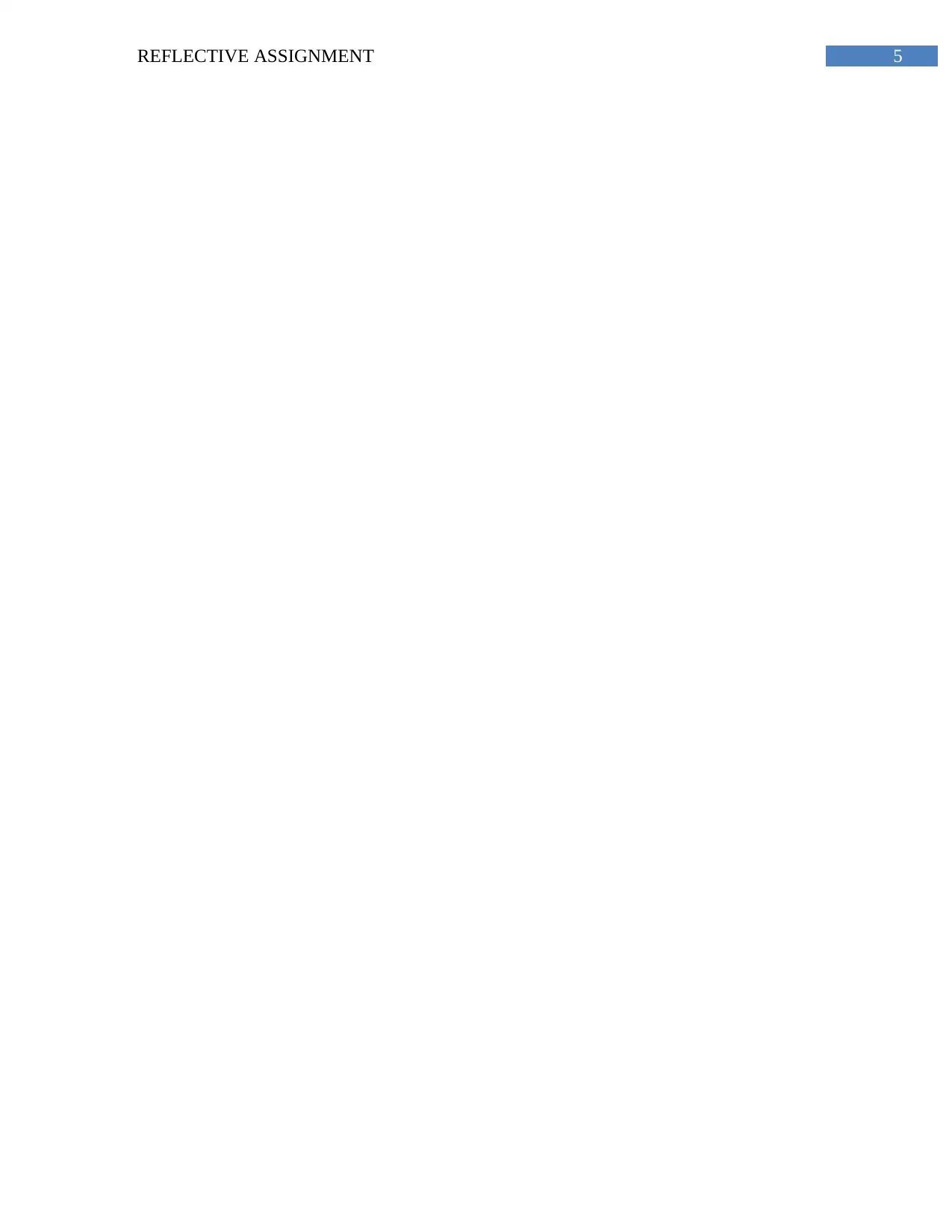
5REFLECTIVE ASSIGNMENT
⊘ This is a preview!⊘
Do you want full access?
Subscribe today to unlock all pages.

Trusted by 1+ million students worldwide
1 out of 6
Related Documents
Your All-in-One AI-Powered Toolkit for Academic Success.
+13062052269
info@desklib.com
Available 24*7 on WhatsApp / Email
![[object Object]](/_next/static/media/star-bottom.7253800d.svg)
Unlock your academic potential
Copyright © 2020–2026 A2Z Services. All Rights Reserved. Developed and managed by ZUCOL.





